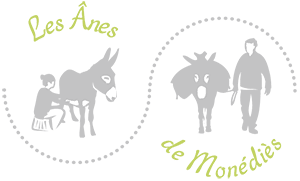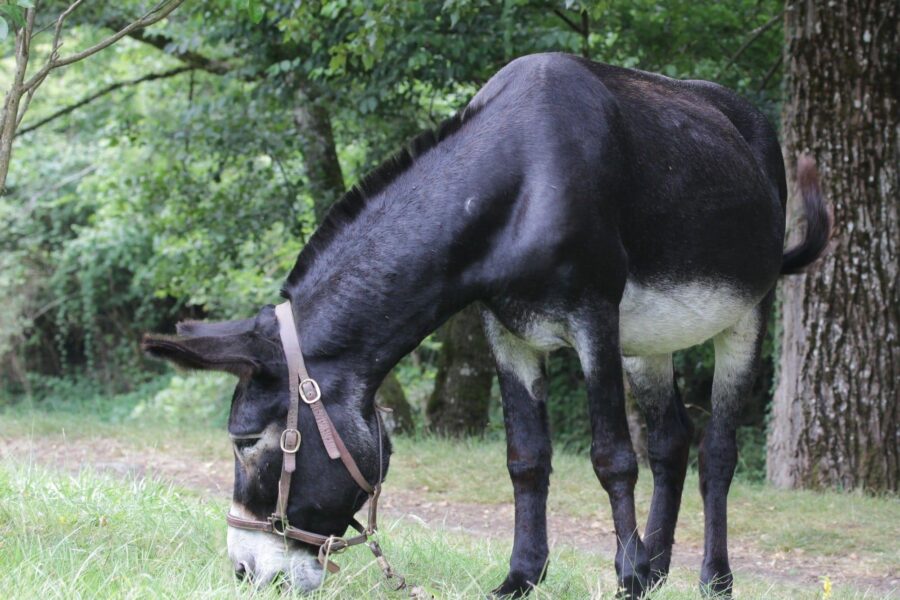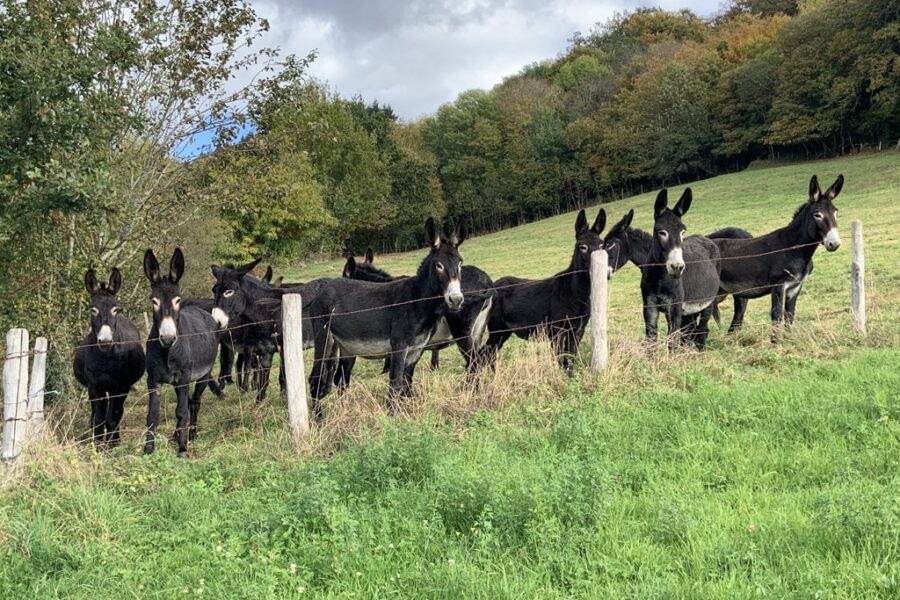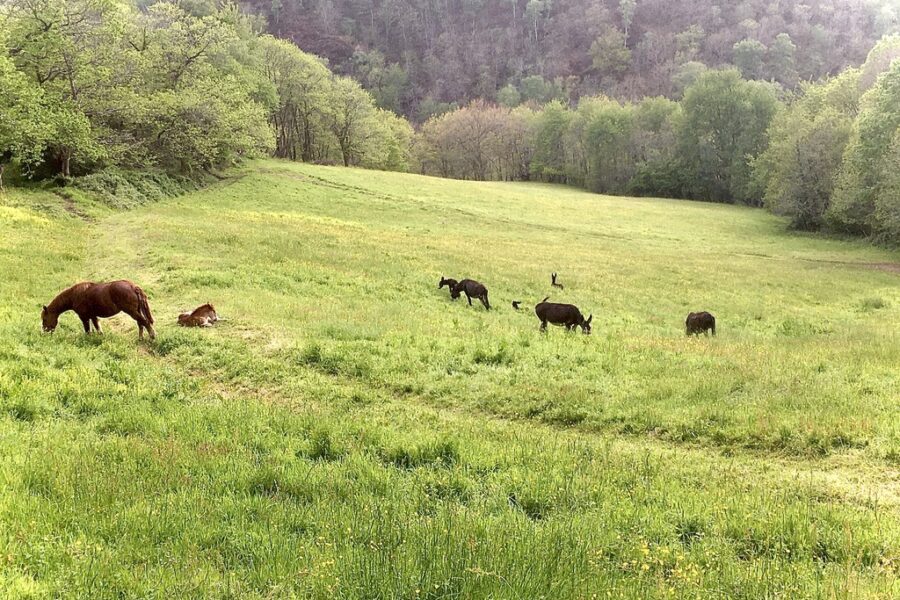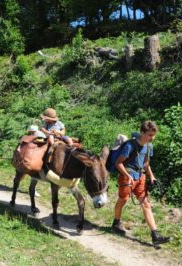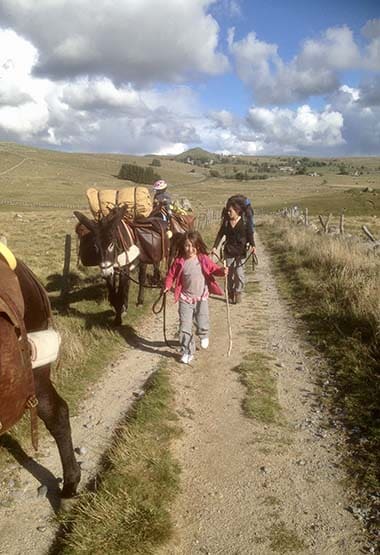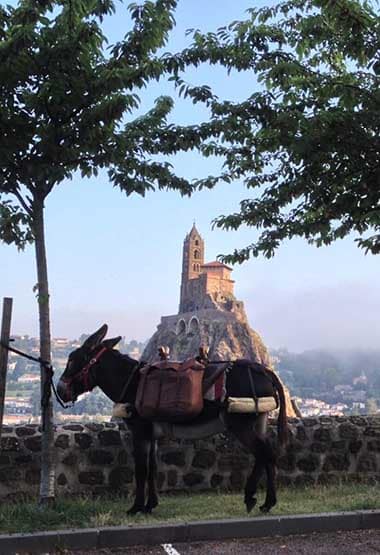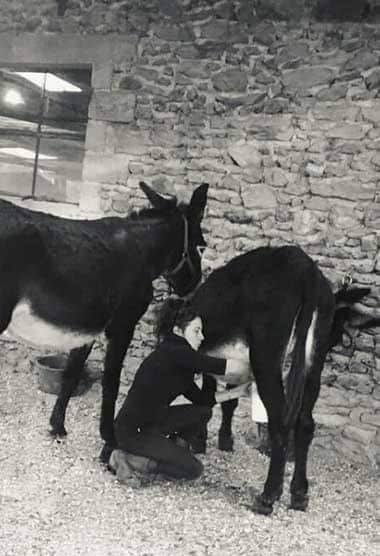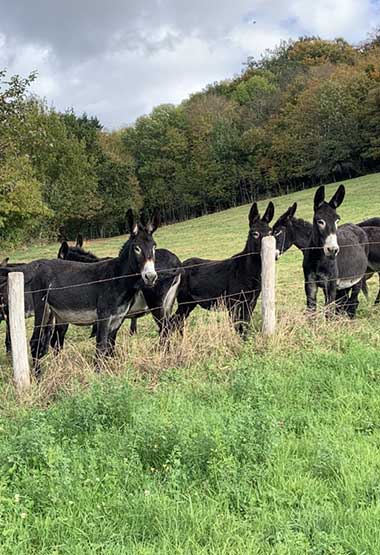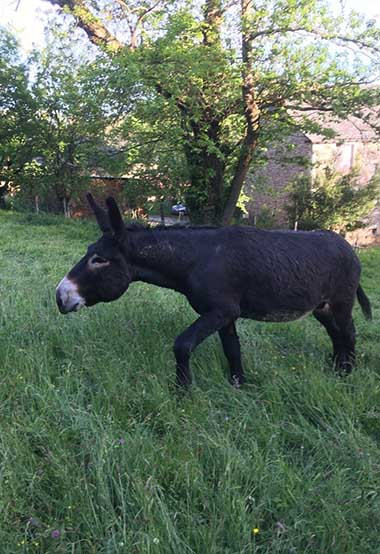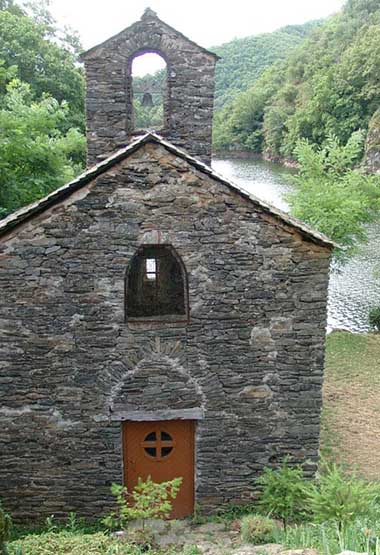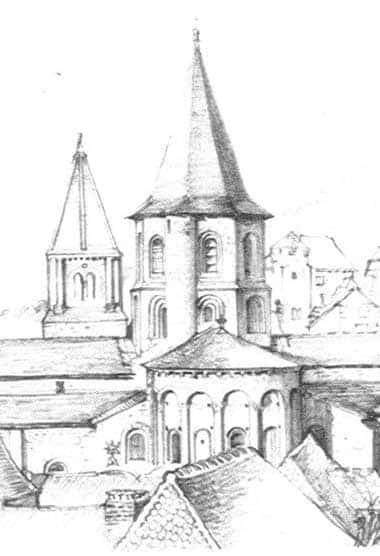Les Ânes de Monédiès : The construction of a family
Everything is one and indivisible, the earth, our family, our animals, … our commitments
The farm of the Donkeys of Monédiès was born in 2007 with the purchase of 2 donkeys of the Pyrenees. Attracted by this endangered breed and passionate about these animals with their touching sensitivity, our lives were soon entirely devoted to breeding, raising our animals and working in a way that respected the land and the environment.
From 2 donkeys in 2007, our life counts today 3 wonderful children…
72 donkeys from the Pyrenees, 3 Breton mares, 2 saddle mares, 1 pony, chickens, geese, rabbits and 80 hectares of land to accommodate and feed all these people.
Sensitized to the agro-environmental problems and concerned to pass on a healthy land to the future generations, we made from the beginning the choice to lead our small family exploitation in Organic Agriculture.
A preserved biodiversity: the wealth of our breeding
Our farm is located in Aveyron, on the border of the Lot and Cantal departments.
This area of medium mountains with its rugged terrain and steep slopes, which are very difficult to mechanize, has made large-scale land consolidation almost impossible and has preserved it from the development of intensive agriculture and livestock farming, with all the chemistry and pollution that this entails. This environment has therefore preserved a very high biodiversity.
The animals are fed entirely from our farm’s own production and benefit from large spaces that allow them to enjoy a rich and diversified diet, changing with the seasons.
Standing grass, chestnuts, walnuts, brambles and during the winter season hay from our permanent meadows as well as barley grown on the farm and given to the animals in the sprouted state.
Our pastures are composed exclusively of permanent grassland on which we find a great diversity of grasses, legumes, various flowers… This multiplicity allows the animals to benefit from a naturally balanced diet offering them a direct access to “God’s pharmacy”.
Presentation of the Pyrenean donkey
The Pyrenean donkey is an old local breed whose standard was defined from old postcards, engravings and hippology manuals of the past centuries.
Today, only the animals registered in the stud-book (genealogical book), either for their ancestry, or initially by a jury representing the association and the National Studs, have the right to the denomination of Pyrenean donkeys.
How to recognize a Pyrenean donkey? The circumference of the eyes, the tip of the nose, the armpits and the belly are white; its dress is dark, black pangaré. His look is energetic, the eye is lively, the ears mobile and planted high on the head!
Our breeding
The breeding of the donkeys of Monédiès was born from the highly improbable meeting between a Belgian garage owner and the Way of St Jacques. In 1998, during my journey from Belgium to Santiago, I had the opportunity to walk with a donkey from the Pyrenees for a week. Seduced by his company, I decided a few years later to acquire my first two females Ginger and Orane in October 2007.
Attracted by this endangered breed and passionate about these animals with their touching sensitivity, our lives were soon entirely devoted to breeding, raising our animals and working in a way that respected the land and the environment.
Numbers of our breeding
Today the farm has about 90 donkeys including 33 females for breeding, 4 stallions (breeding males), 31 geldings (castrated males) at work for the rides, and about twenty foals and young donkeys between 6 months and 5 years old who are patiently learning their future job.
But also… 4 Breton draft mares, 2 saddle mares, 1 pony, 60 ewes, chickens, geese, rabbits and 120 ha of land to accommodate and feed all these beautiful people.
The breeding season of the Pyrenean donkeys
The breeding season takes place at the return of the beautiful days and is done naturally and in freedom in the meadows without any intervention of our part on our donkeys, it is what one calls it of the mounting in freedom.
We also offer to cover our stallions, donkeys from the Pyrenees approved for breeding, for third parties. We take the donkeys in pension at the farm or rent the stallion.
All information by mail or phone
Our donkeys are put to reproduction, and consequently to milk production every other year. During these years of gestational rest, the donkeys take part in the tourist season of donkey riding, which allows them to tone and muscle their bodies altered by 12 months of gestation and 8 to 9 months of lactation.
The birth s take place in the spring on our farm in a dedicated space not far from the house, in order to be able to watch and intervene in case of need.
The donkeys and their mothers will stay with us during the first months and until the end of the milking season. Our children will take care of their socialization and the impregnation of the donkeys by their visits.
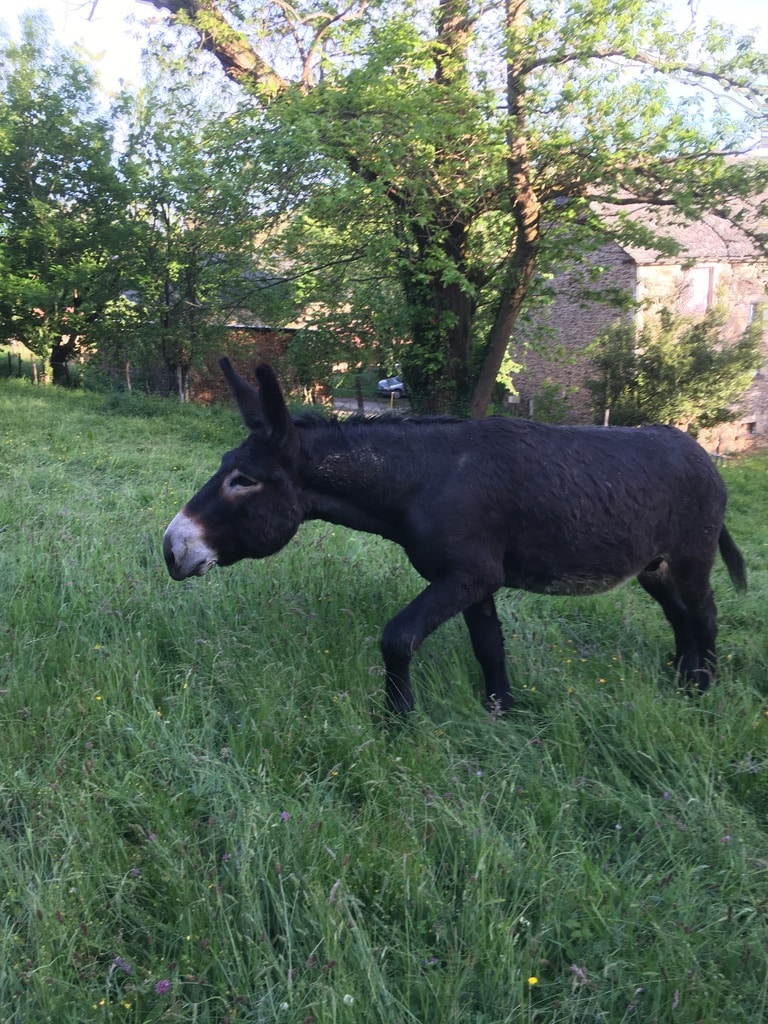
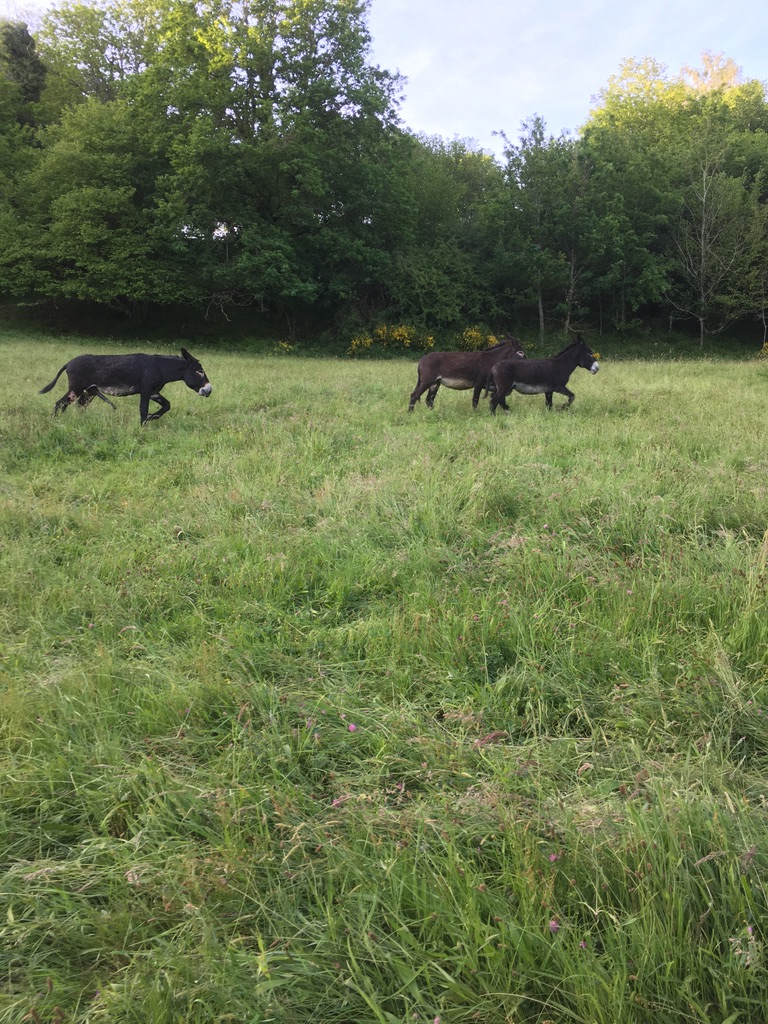
Milking donkeys for milk production
We start milking the donkeys when they are 3 months old. For the good of their growth, it is essential that they can take full advantage of their mother’s milk during these first months of life and until they start to diversify their diet. From then on, the sharing of the milk can begin…
In order to privilege a serene and natural contact with our donkeys, we carry out the milking manually, twice a day at 6:00 am and at 12:30 pm.
For the donkeys to offer their milk, it is essential that their young stay by their side and continue to suckle. We separate the mothers and their cubs only a few hours before milking while allowing them to keep a visual, tactile and olfactory link during these hours of separation.
A donkey produces about 1,2 liter of milk per day.
We attach great importance to the well-being and serenity of the donkeys and their young. These moments of milking are privileged moments of sharing which create a precious climate of confidence between the animal and the man that the donkeys will preserve throughout their life.
The milking season lasts about 4 months. It starts in September when the rental season for trekking donkeys ends and ends in early January.
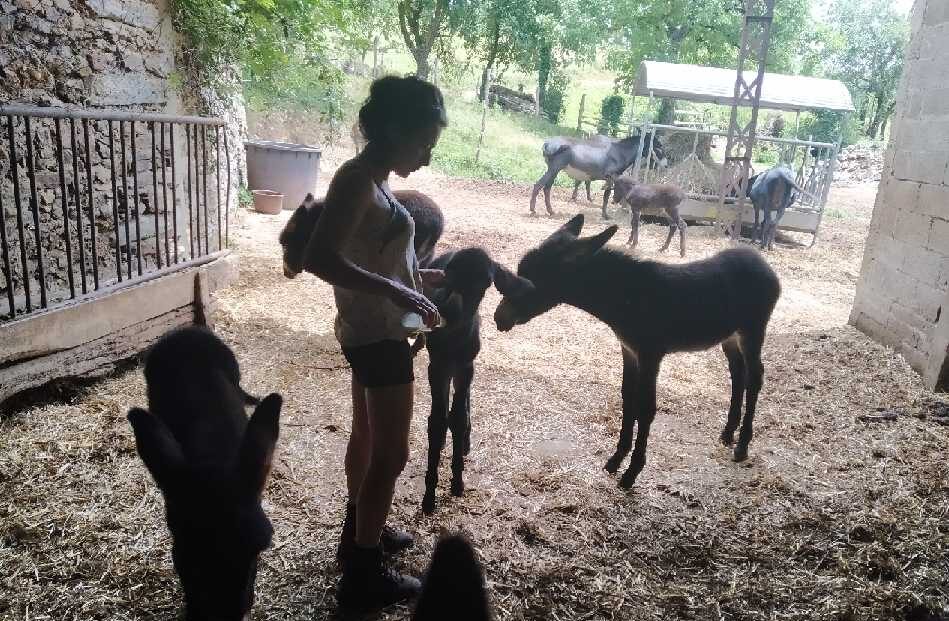
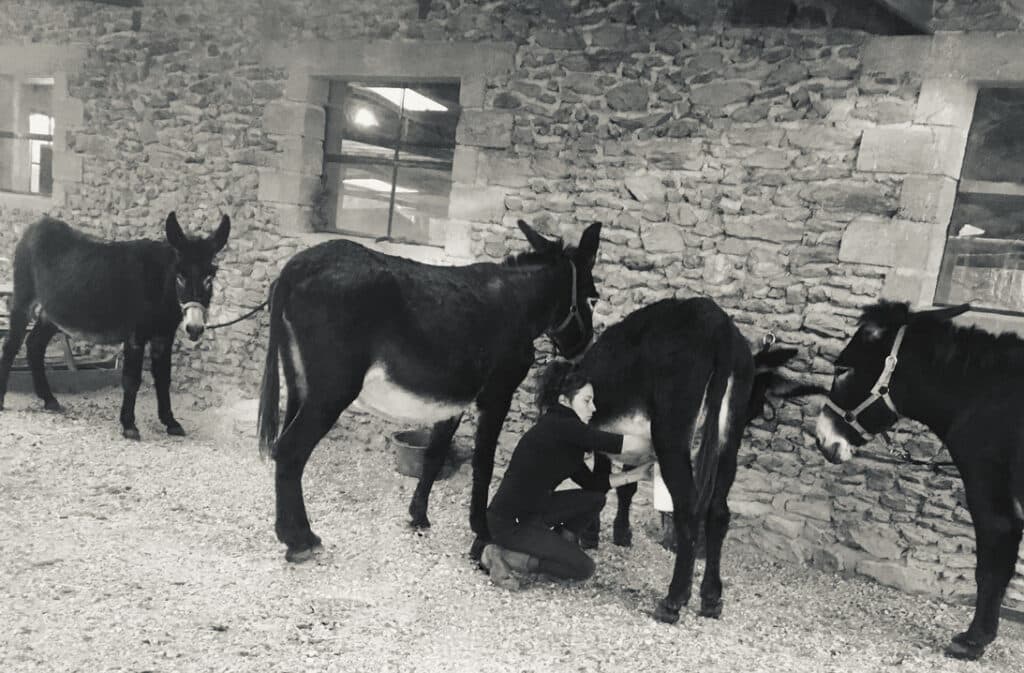
The future of our donkeys
Once weaned at about 9 months of age, the foals grow up peacefully within the herd until they are old enough to work
Some of them will find a buyer with whom they will be used for leisure, animal traction (market gardening with donkey, skidding …), asinotherapy, maintenance of plots …
The others will stay by our side and become pack donkeys that will accompany young and old to memorable donkey riding vacations on the paths of our beautiful region.
Our donkeys are not put to work with the public before the age of 5 years in order to allow them the best possible development and the necessary maturity to be entrusted in the best conditions to families usually novices and most of the time with young children.
The females once adult, around the age of 5 years, will be put to the reproduction and will give us the joy of new births and will participate in the milk production of the donkeys of Monédiès.
We attach great importance to the well-being of our animals and their future.
None of our donkeys is destined for human consumption (no butchery at Zenoni).
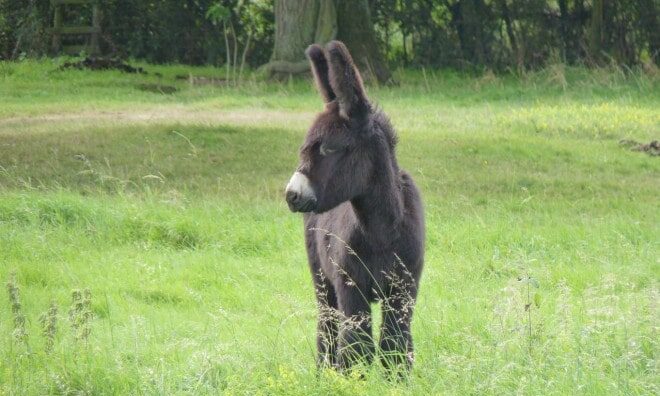

A preserved biodiversity: The richness of our breeding
Our farm is located in Aveyron, on the border of the Lot and Cantal departments.
This area of medium mountains with its rugged terrain and steep slopes, which are very difficult to mechanize, has made large-scale land consolidation almost impossible and has preserved it from the development of intensive agriculture and livestock farming, with all the chemistry and pollution that this entails. This environment has therefore preserved a very high biodiversity.
The animals are fed entirely from our farm’s own production and benefit from large spaces that allow them to enjoy a rich and diversified diet, changing with the seasons.
Standing grass, chestnuts, walnuts, brambles and during the winter season hay from our permanent meadows as well as barley grown on the farm and given to the animals in the sprouted state.
Our pastures are composed exclusively of permanent grassland on which we find a great diversity of grasses, legumes, various flowers… This multiplicity allows the animals to benefit from a naturally balanced diet offering them a direct access to “God’s pharmacy”.
Sensitized to the agro-environmental problems and concerned to pass on a healthy land to the future generations, we made from the beginning the choice to lead our small family exploitation in Organic Agriculture.
Good to know …
Know that by going on a hike with our donkeys, by drinking their milk or by buying one of them, you are accomplishing a militant act, because thePyrenean donkey is an endangered breed.
In this way, you actively participate in the preservation of an endangered species that has been selected over the centuries for its courage, hardiness and agility on steep paths.
All our donkeys are trained in the pack and the harness, socialized and used to children.
We are members of the Pyrenean Donkey Association.
To learn more about the donkeys of the Pyrenees, visit the website of the Association L’Ane des Pyrénées
